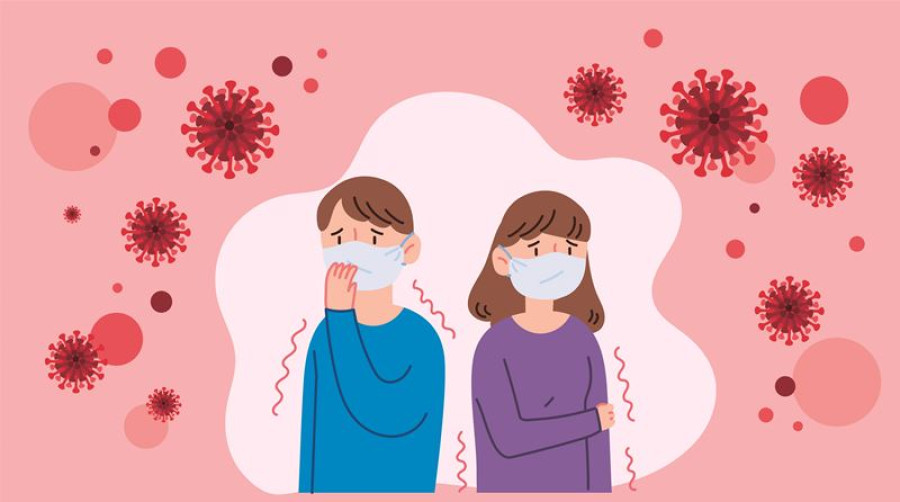Health
Coping with Covid stress
Many people are feeling emotionally distressed in these unsettling times. The best way to handle this, say psychologists, is to understand where your fear is coming from.
Srizu Bajracharya
When Elisha recently visited a hospital in Jhamsikhel for a check-up amid the nation-wide lockdown, she felt agitated. At the hospital, as she waited for her turn to meet the doctor, her muscles tightened as she observed the environment of the hospital. There were not many people around and yet she felt uneasy. She could see that some people didn’t have masks on. Nurses were moving from one room to another without proper protective equipment. And there were patients with high fever waiting in chairs.
“Once I got out of the hospital, I was gasping for air. I couldn’t breathe properly. I was scared and regretted coming to the hospital in the first place,” said Elisha, who wants to be referred only by her first name. Once home, she immediately took a shower and washed the clothes she wore to the hospital. But her overriding fear didn’t wane. “I still felt like I couldn’t breathe properly, later I had diarrhoea which got me thinking about the symptoms of Covid-19,” she said.
With the country now on lockdown for almost a month, to curb the spread of the virus, many people, like Elisha, have been feeling an overwhelming amount of mental stress—whether it be from reading the news, visiting hospitals or just from being isolated in self-quarantine because of the lockdown. And, however stressful the situation, there are ways to cope with this stress, say psychologists, and the first step to getting rid of this stress is realising its existence and giving up controlling the uncontrollable.
“The pandemic is outside our control and it's normal for us to feel scared. It is scary not to be able to protect ourselves or our family from something invisible,” says Renuka Manandhar, psychosocial counselling psychologist at Counselors Alliance for Psychological Support and Counseling Nepal. But when that fear overrides, it affects our cognition and consequently brings changes in our behaviour and affects our physical body, she says.
The cognition is a mental action of processing and understanding information, “but when the brain feels an excessive amount of fear, it fails to rationalise and comprehend information, environment or any situation,” says Manandhar. And in consequence, starts hampering our behaviour and emotion.
However, this condition is not to be confused with mental illness. “What people are feeling right now is an acute stress reaction, it’s not a mental illness—its a reaction to overburdening stress of the pandemic and the environment we are living in,” says Bharat Gautam, a clinical psychologist with Transcultural Psychosocial Organisation (TPO) Nepal.
Significant traces of mental stress
As people adjust with their lives indoors, they are all going through a psychological change. But not everyone is able to deal with this type of reality with strength. People could be feeling anxious, guilty, helpless, insecure, says Manandhar, who also works at Crystal Counseling and Psychotherapy and Training Center. “They could be feeling disoriented even. And some perhaps will be unable to express what they are going through,” says Manandhar. “Nothing of this environment is normal, but there are certain things to keep in mind to understand and know what you and others might be going through,” says Manandhar.
But how can you tell what you or your loved one is going through? Frequent symptoms of mental stress include irritation, anger, isolation, exhaustion even over doing nothing. “Some may also feel a loss of appetite or increase in appetite, obstruction in carrying out a daily routine, disinterest in doing what you love,” says Manandhar. Many can also feel sweaty and uneasy.
“They could also have sleeping problems, bowel and bladder disturbances like having to go to the toilet frequently,” says Gautam.
Extreme mental stress can also make people have dysfunctional thoughts, “wherein they will focus more on the negative information and thought process,” says Gautam. Consequently affecting the human mind’s attention and concentration. “In this stage, people won’t be able to do things even when they try to do it. They will feel disturbed,” he says. In this severity, people may also become more forgetful and may obsessively tally their symptoms with that of the virus.
“That’s when they will think about their sore throat, their coughs and headache with the symptoms of the virus,” says Gautam. “But overthinking can also give headaches and body aches,” says Gautam.
Elisha, a few days after her return from the hospital, had found herself beaten down with the fear of the virus. She felt guilty of her actions and felt irresponsible towards her ageing parents. But a week later, she started feeling much better.
“I realised that I was overthinking. Whatever I had been reading had been taking a toll on me,” she says. “Of course, it hasn’t been that easy to distance myself with the negativity that surrounds our situation, but I am trying,” she says.
How to keep the stress at bay
According to psychologists, the Covid-19 global outbreak has pushed people into the ‘fear’ zone of the three psychological zones: fear, learning and growth. “When we are in the fear zone we keep thinking negatively, we are constantly feeding our fear, but when we are in the learning zone we acknowledge our fear and work around what we can control and give up on the stress; in the growth zone we try to help with what we can,” says Manandhar. “And that is where we want to go ideally towards, but that transition is difficult because first, you need to realise you have a problem.”
But once you are hit with that realisation that you need to get out of the fear zone, you can help yourself and others, says Manandhar. “There are tricks and techniques and some exercises,” she says.
Distraction is key
The first thing on her list is to stay away from the object or subject of stress. “If you are looking at news of the virus, focus also on the source of information. Pay more attention to the positive outlook of life. Spend time doing things you like, and socialise with people over phone calls. Remember we are just avoiding physical distance not mental distance,” she says.
Deep breaths really help
According to Manandhar, deep breathing exercises also help ease our body’s stress. “Whenever you feel panicky or scared, taking deep breaths always help as it relaxes us,” says Manandhar. Many people are also practising mindful meditation, and yoga which help the body relax and the mind compose itself says Manandhar. “Meditation trains our mind and helps us to become more aware. But what could also work is music therapy,” says Manandhar.
Seek psychological help if need be
But if people are feeling severe difficulty with depressive feelings, clinical psychological counselling is necessary, say psychologists. “Our body has a way of telling us that we are not doing well, and if you are having problems sleeping and even thinking properly in extremity and losing a good appetite, you need to seek psychological counselling,” says Manandhar.
More importantly, if one is having difficulty expressing themselves and socialising with people even when practicing their own mechanisms to get rid of the stress, says Gautam. Both Manandhar and Gautam are providing tele counselling to many people from across the country to help them cope with their reality and work on their fear and stress since the lockdown. Many organisations like Counselors Alliance for Psychological Support and Counseling Nepal, Crystal Counseling and Psychotherapy and Training Center, TPO Nepal, TSOP Nepal and many other organisations have also been offering people tele counselling.
Accept the fear, and let it go
“It’s natural for everyone to feel overwhelmed in this pandemic, while many people could be dealing with it more easily than others, it doesn’t mean that those who live in fear can not get over their insecurities,” says Gautam. “It’s necessary for people to understand that everyone has the potential of working their way out of this fear and stress. And different people have different ways of handling fear.”




 7.12°C Kathmandu
7.12°C Kathmandu













%20(1).jpg&w=300&height=200)
